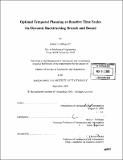Optimal temporal planning at reactive time scales via dynamic backtracking branch and bound
Author(s)
Effinger, Robert T
DownloadFull printable version (13.11Mb)
Other Contributors
Massachusetts Institute of Technology. Dept. of Aeronautics and Astronautics.
Advisor
Brian C. Williams.
Terms of use
Metadata
Show full item recordAbstract
Autonomous robots are being considered for increasingly capable roles in our society, such as urban search and rescue, automation for assisted living, and lunar habitat construction. To fulfill these roles, teams of autonomous robots will need to cooperate together to accomplish complex mission objectives in uncertain and dynamic environments. In these environments, autonomous robots face a host of new challenges, such as responding robustly to timing uncertainties and perturbations, task and coordination failures, and equipment malfunctions. In order to address these challenges, this thesis advocates a novel planning approach, called temporally-flexible contingent planning. A temporally-flexible contingent plan is a compact encoding of methods for achieving the mission objectives which incorporates robustness through flexible task durations, redundant methods, constraints on when methods are applicable, and preferences between methods. This approach enables robots to adapt to unexpected changes on-the-fly by selecting alternative methods at runtime in order to satisfy as best possible the mission objectives. The drawback to this approach, however, is the computational overhead involved in selecting alternative methods at runtime in response to changes. (cont.) If a robot takes too long to select a new plan, it could fail to achieve its near-term mission objectives and potentially incur damage. To alleviate this problem, and extend the range of applicability of temporally-flexible contingent planning to more demanding real-time systems, this thesis proposes a temporally-flexible contingent plan executive that selects new methods quickly and optimally in response to changes in a robot's health and environment. We enable fast and optimal method selection through two complimentary approaches. First, we frame optimal method selection as a constraint satisfaction problem (CSP) variant, called an Optimal Conditional CSP (OCCSP). Second, we extend fast CSP search algorithms, such as Dynamic Backtracking and Branch-and-Bound Search, to solve OCCSPs. Experiments on an autonomous rover test-bed and on randomly generated plans show that these contributions significantly improve the speed at which robots perform optimal method selection in response to changes in their health status and environment.
Description
Thesis (S.M.)--Massachusetts Institute of Technology, Dept. of Aeronautics and Astronautics, 2006. Includes bibliographical references (p. 110-115).
Date issued
2006Department
Massachusetts Institute of Technology. Department of Aeronautics and AstronauticsPublisher
Massachusetts Institute of Technology
Keywords
Aeronautics and Astronautics.